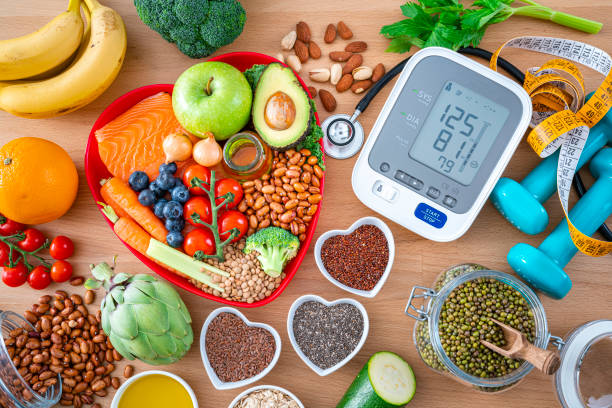What is the DASH Diet?
The DASH diet, which stands for Dietary Approaches to Stop Hypertension, is a lifelong approach to healthy eating that’s designed to help treat or prevent high blood pressure (hypertension). Developed through research sponsored by the U.S. National Institutes of Health (NIH), the DASH diet emphasizes a balanced approach to nutrition, reduced sodium intake, and a focus on whole foods.
But DASH isn’t just for people with high blood pressure its benefits extend to overall cardiovascular health, weight loss, diabetes prevention, and even improved mental function.
Key Principles of the DASH Diet:
The DASH diet is centered on the following core elements:
- Low sodium intake (standard: <2,300 mg/day; lower-sodium version: <1,500 mg/day)
- High intake of fruits and vegetables
- Whole grains instead of refined grains
- Low-fat dairy
- Lean protein sources (especially fish, poultry, and legumes)
- Limited red meat and sweets
- Rich in potassium, calcium, magnesium, and fiber
Health Benefits of the DASH Diet:
The DASH diet offers numerous health benefits, especially for heart health. It helps lower high blood pressure, reduce bad cholesterol, and support weight loss. Rich in nutrients such as potassium, calcium, and fiber, the DASH diet also lowers the risk of heart disease, stroke, and type 2 diabetes. It’s a balanced, sustainable eating plan for long-term health and wellness.
1. Lowers Blood Pressure:
The DASH diet was specifically developed to reduce blood pressure. Studies show that people following DASH can reduce their systolic blood pressure by 8–14 points—a significant improvement.
2. Supports Weight Loss:
Although not designed as a weight-loss diet, the DASH plan’s focus on whole, nutrient-dense foods and portion control can naturally lead to healthy weight loss, especially when combined with regular physical activity.
3. Reduces Risk of Cardiovascular Disease:
By lowering LDL cholesterol and improving heart function, the DASH diet significantly reduces the risk of heart disease, stroke, and heart failure.
4. Helps Prevent Type 2 Diabetes:
With its low glycemic load and high fiber content, the DASH diet is effective in improving insulin sensitivity and lowering blood sugar, making it ideal for people with or at risk for diabetes.
5. Improves Kidney Function:
For those with chronic kidney disease or at risk, DASH helps by managing sodium, potassium, and phosphorus levels. However, those with advanced kidney disease should consult a doctor before starting DASH.
Sample One-Day DASH Meal Plan:
| Meal | Foods |
|---|---|
| Breakfast | Oatmeal with banana slices and skim milk; black coffee |
| Snack | Greek yogurt with berries |
| Lunch | Turkey sandwich on whole grain bread with lettuce, tomato; apple |
| Snack | Raw almonds (1 oz); baby carrots |
| Dinner | Grilled salmon, brown rice, steamed broccoli; side salad with olive oil |
| Dessert | Baked apple with cinnamon |
Tips for Starting the DASH Diet:
- Start Slow: Begin by adding one fruit or vegetable serving per day, and gradually reduce sodium intake.
- Read Labels: Look for low-sodium or no-added-salt products.
- Cook at Home: Control ingredients and sodium better than eating out.
- Choose Whole Over Processed: Opt for whole grains, fresh produce, and lean meats.
- Plan Your Meals: Create weekly menus and shopping lists to stay on track.
Potential Challenges:
- Sodium Reduction: It may take time to adjust to lower-sodium foods.
- Cost of Fresh Produce: Plan around seasonal sales or frozen alternatives.
- Meal Preparation: Requires more cooking than fast-food or prepackaged meals.
Is the DASH Diet Right for You?
The DASH diet is ideal for most adults, especially those with:
- High blood pressure
- Heart disease or high cholesterol
- Family history of cardiovascular issues
- Type 2 diabetes or prediabetes
- Desire for a long-term, balanced eating plan
However, individuals with advanced kidney disease or other specific conditions should consult a healthcare provider, as DASH is high in potassium and magnesium.
Final Thoughts:
The DASH diet is scientifically backed, flexible, and sustainable. It promotes not only lower blood pressure but also overall well-being through balanced, nutritious eating. Unlike restrictive diets, DASH encourages a holistic lifestyle change—and for many, it’s the key to long-term heart health.
